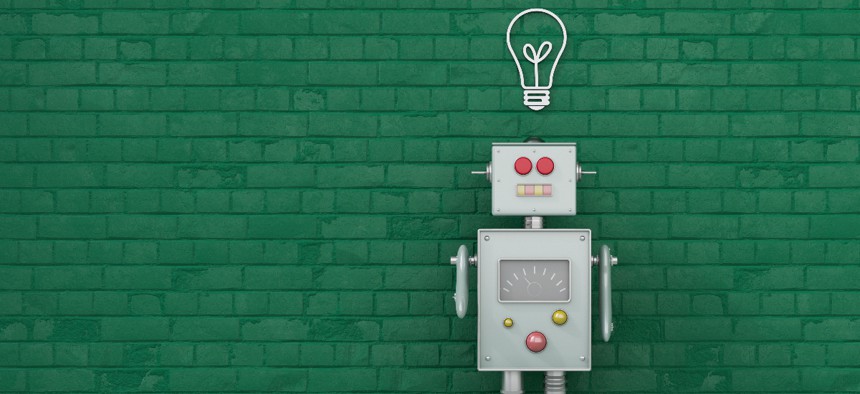Government Considers Whether AI Can Invent Something Patentable

Westend61/Getty Images
The U.S. Patent and Trademark Office seeks public comments on the intersection of artificial intelligence and inventorship.
As artificial intelligence is used more and more to innovate, the United States Patent and Trademark Office is looking to address the question of whether AI can be listed as an inventor on a patent, according to a Federal Register notice published on Tuesday.
While the USPTO aims to incentivize and protect innovation, including those achieved with the help of AI, the agency is interested in public insight on “the current state of AI technologies and on inventorship issues that may arise with their advancement, especially as AI plays a greater role in the innovation process.”
The filing is a continuation of the agency’s exploration into AI issues. For example, the USPTO formed the Artificial Intelligence and Emerging Technologies—or AI/ET—Partnership in June 2022 to give stakeholders opportunities to share ideas, feedback and experiences. The agency is examining other ways to inform future efforts on inventorship and promote AI-assisted innovation.
In 2019, the USPTO asked several questions on this topic, including, “the different ways a natural person can contribute to the conception of an AI invention and whether current laws and regulations involving inventorship need to be revised to consider contributions from entities other than natural persons.” Previous responses were mixed: some felt the law could handle AI-enabled inventions, and others stated that AI could invent something without human intervention. At a June 2022 AI/ET Partnership meeting, participants presented conflicting views over whether AI is just another tool or if it can conceptualize patentable inventions or “contribute at the level of a joint inventor.”
In the meantime, the USPTO stated that it has received applications naming an AI machine as the inventor, which it denied because, under current law, “inventorship is limited to a natural person(s).” The decision was upheld in court, but the court did not address the question of whether human-made inventions with the assistance of AI were patentable.
In light of this legal gap and because of AI’s increasing role with inventions, the USPTO stated “there remains uncertainty around AI inventorship,” particularly for machine learning because such tech may already be at the level of joint inventor today.
As noted in the filing, the USPTO seeks comments on the current state of AI in the invention process and how the agency should address inventions with a significant amount of contribution from AI. Additionally, the agency is looking to collaborate with academia on the matter to support increased academic engagement regarding inventorship and AI-enabled innovations.
The USPTO has several questions it is asking for public comment, including:
- How is AI being used in the invention process?
- How does AI differ from other tech invention tools?
- If an AI system contributes to an invention at the same level as a person, who would be the joint inventor? Under current law, is the invention patentable?
- Does significant AI contributions to the level of joint inventor raise ownership issues?
- Does USPTO need to expand its guidance on inventorship to address those with significant AI contributions? How should this be addressed?
- Should USPTO require applicants to explain AI contributions, and if so, how?
- What other steps should USPTO take to incentivize AI-enabled innovation?
- What else should USPTO do to mitigate risks and harms from AI-enabled innovation?
- What statutory changes should be considered?
- Are there laws in other countries that address the issue of significant AI contribution for inventions and inventorship?
- What focus areas should USPTO explore for future engagements on this topic?
General comments and responses to identified questions are due 90 days after the publication date via the Federal eRulemaking Portal. However, submissions intended for the special issue of the “Journal of the Patent and Trademark Office” have until July 1 to be received by email to the journal.
NEXT STORY: NASA Uses AI to Design Mission Hardware






